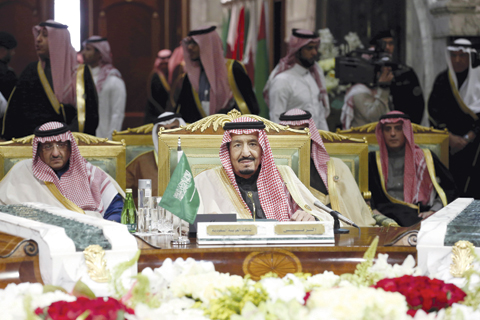 RIYADH: King Salman of Saudi Arabia (center) attends the closing session of the 36th Gulf Cooperation Council Summit in Riyadh yesterday. — AP
RIYADH: King Salman of Saudi Arabia (center) attends the closing session of the 36th Gulf Cooperation Council Summit in Riyadh yesterday. — APRIYADH: Gulf monarchs yesterday endorsed a "political solution" for war-ravaged Syria, under an international framework agreed to last month. At the end of a two-day annual summit, the Gulf Cooperation Council (GCC) rulers said they "support a political settlement... that guarantees the territorial integrity and independence of Syria." The GCC represents the oil and gas-rich states of Bahrain, Kuwait, Oman, Qatar, Saudi Arabia and the United Arab Emirates.
Their announcement came as Syrian opposition and armed groups met elsewhere in Riyadh in an attempt to form a unified front ahead of possible talks with the regime of President Bashar Al-Assad. The meeting follows an agreement last month in Vienna between diplomats from 17 countries, including Saudi Arabia, for a political transition and end to the Syrian war. The GCC "welcomed the conclusions of the Vienna meetings," the Gulf statement said. The Vienna plan set a January 1 target for peace talks and would see a transitional government set up in six months and elections in 18 months. Since 2011 more than 250,000 people have been killed in Syria and millions of others forced into exile.
FM criticizes Iran
As Gulf Arab leaders reiterated their calls for a political solution to the wars in Yemen and Syria, the kingdom's foreign minister went a step further and criticized Iran's role in those conflicts. Foreign Minister Adel Al-Jubeir told reporters after the two-day summit in Riyadh concluded that "Iran is playing a negative role in most regional issues." He added that he met only for "a few minutes" with his Iranian counterpart in Vienna last month on the sidelines of a meeting to discuss ways to end the nearly five-year Syrian war, in which Saudi Arabia and Iran are backing opposite sides of the conflict.
Riyadh is also hosting a Syrian opposition summit that gathered more than 100 factions, including rebel groups, in an effort to unite their ranks ahead of proposed peace talks with Syrian President Bashar Assad's government. Al-Jubeir said that the kingdom hopes for better relations with Iran, but added the Islamic Republic's policies have hindered diplomatic ties. His comments point to the struggle for regional supremacy between the Sunni kingdom and the Shiite republic that has played out in conflicts in Bahrain, Lebanon, Syria and Yemen, where Saudi Arabia is leading an Arab military intervention against Shiite rebels who are backed by Iran.
However, the official statement from the six-nation Gulf Cooperation Council over the meeting refrained from directly criticizing Iran, but instead condemned terrorism and called on Yemen's warring sides to reach a desirable political solution. The GCC also called for a political transitional period in Syria that eventually leads to free and fair multiparty elections. Leaders from Kuwait, Qatar, Bahrain, the United Arab Emirates and a senior royal official from Oman took part in the summit, which was held in King Salman's Diraya palace.- Agencies










